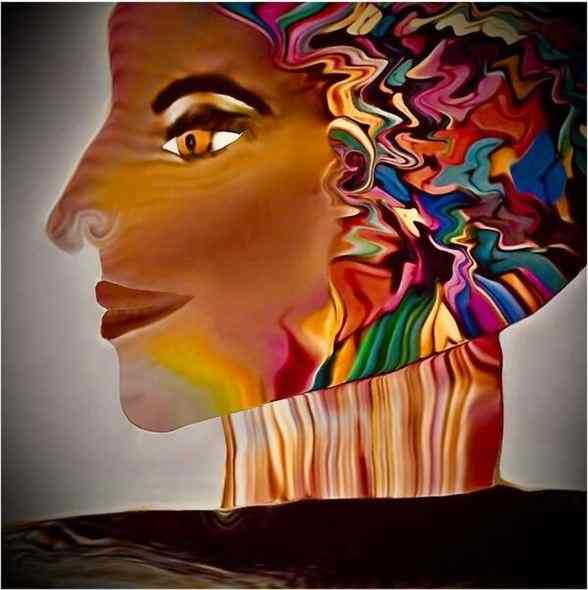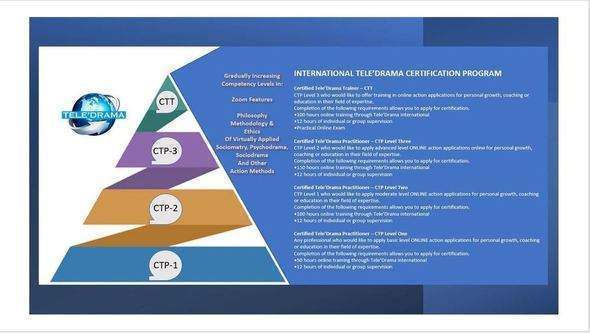EVENTS
INTEGRATING BUDDHIST PSYCHOLOGY, PSYCHODRAMA, SOCIOMETRY, AND GROUP PROCESS: CERTIFICATION PROGRAM

DATES:
Fridays, Jan 9, 16, 23, 30; Feb 6, 13, 20, 27; Mar 6, 13, 2026
TIME:
Psychodrama & Tele'Drama Trainees: $699
College students & Retirees: $599 PRESENTER(S): Daniela Simmons, PhD, TEP
Jaye Moyer, LCSW, TEP, CTP-2
- Pacific Time (U.S. & Canada): 7:00 AM – 9:00 AM
- Mountain Time (U.S. & Canada): 8:00 AM – 10:00 AM
- Central Time (U.S. & Canada): 9:00 AM – 11:00 AM
- Eastern Time (U.S. & Canada): 10:00 AM – 12:00 PM
- UK Time (GMT/BST): 3:00 PM – 5:00 PM
- Central European Time (CEST): 4:00 PM – 6:00 PM
Psychodrama & Tele'Drama Trainees: $699
College students & Retirees: $599 PRESENTER(S): Daniela Simmons, PhD, TEP
Jaye Moyer, LCSW, TEP, CTP-2
Certification Program
INTEGRATING BUDDHIST PSYCHOLOGY, PSYCHODRAMA, SOCIOMETRY, AND GROUP PROCESS
© Tele'Drama
Directed by: Jaye Moyer, LCSW, TEP, CTP-2 & Daniela Simmons, PhD, TEP
The course offers 20 hours of online psychodrama training that count toward certification through the American Board of Examiners (ABE) and the International Society for Experiential Professionals (ISEP).
Buddhist Psychology is one of the related fields approved by the American Board of Examiners (ABE) for the certification process as Certified Practitioners (CPs) and Trainers, Educators, and Practitioners (TEPs).
Module 1: January 9, 2026
Module 2: January 16, 2026
Module 3: January 23, 2026
Module 4: January 30, 2026
Module 5: February 6, 2026
Module 6: February 13, 2026
Module 7: February 20, 2026
Module 8: February 27, 2026
Module 9: March 6, 2026
Module 10: March 13, 2026
Program Overview
An advanced professional certification program designed for individuals with prior training or experience in psychodrama, sociodrama, sociometry, or other action methods. This program supports practitioners in deepening and expanding their competency by integrating mindfulness practices and core teachings of Buddhist psychology into their work with individuals, groups, and communities.This 10-session experiential training equips professionals with practical tools for applying mindful role exploration, relational mapping, and action-based interventions with clients, while also supporting their own personal insight and professional embodiment of these methods.
Buddhist Psychology offers a rich and complementary resource for Experiential Therapists and Psychodramatists. With its emphasis on direct experience, embodied awareness, and the fluidity of identity, it aligns naturally with action methods that explore roles, relational dynamics, and the unfolding present moment.Whether in warm-up, enactment, or integration, Buddhist psychological principles can support therapists in cultivating mindful attention, emotional regulation and ethical clarity—essential elements for safe and impactful experiential work. This program invites practitioners to integrate these teachings, not as doctrine, but as a living, practical framework that enriches the depth and presence of their therapeutic practice.
Who Should Attend
This training is intended for professionals with experience in action methods, including:
Modules
Module 1:
Orientation & Intention – Setting the PathThemes:
Experiential:
Educational Goals:
Module 2:
The Four Noble Truths in ActionThemes:
Experiential:
Educational Goals:
Module 3:
The Worldly Winds – What Moves Us?Themes:
Experiential:
Educational Goals:
Module 4:
Ethical Foundations – Living the PreceptsThemes:
Experiential:
Educational Goals:
Module 5:
Inner Roles – Exploring Identity and Voice with Kind CuriosityThemes:
Experiential:
Educational Goals:
Module 6:
Sociometry & the Relational FieldThemes:
Experiential:
Educational Goals:
Module 7:
Cultivating the Heart – Introduction to the Brahma ViharasThe Brahma Viharas are four qualities of heart that promote emotional well-being and compassionate living:
Educational Goals:
Module 8:
Joy & Mudita – Cultivating Inner ResourceTheme:
Experiential:
Educational Goals:
Module 9:
Release & Ritual – Letting Go, Letting Be and EquanimityThemes:
Experiential:
Educational Goals:
Module 10:
The Future Self & Closing CircleThemes:
Experiential:
Educational Goals:
INTEGRATING BUDDHIST PSYCHOLOGY, PSYCHODRAMA, SOCIOMETRY, AND GROUP PROCESS
© Tele'Drama
Directed by: Jaye Moyer, LCSW, TEP, CTP-2 & Daniela Simmons, PhD, TEP
The course offers 20 hours of online psychodrama training that count toward certification through the American Board of Examiners (ABE) and the International Society for Experiential Professionals (ISEP).
Buddhist Psychology is one of the related fields approved by the American Board of Examiners (ABE) for the certification process as Certified Practitioners (CPs) and Trainers, Educators, and Practitioners (TEPs).
Module 1: January 9, 2026
Module 2: January 16, 2026
Module 3: January 23, 2026
Module 4: January 30, 2026
Module 5: February 6, 2026
Module 6: February 13, 2026
Module 7: February 20, 2026
Module 8: February 27, 2026
Module 9: March 6, 2026
Module 10: March 13, 2026
Program Overview
An advanced professional certification program designed for individuals with prior training or experience in psychodrama, sociodrama, sociometry, or other action methods. This program supports practitioners in deepening and expanding their competency by integrating mindfulness practices and core teachings of Buddhist psychology into their work with individuals, groups, and communities.This 10-session experiential training equips professionals with practical tools for applying mindful role exploration, relational mapping, and action-based interventions with clients, while also supporting their own personal insight and professional embodiment of these methods.
Buddhist Psychology offers a rich and complementary resource for Experiential Therapists and Psychodramatists. With its emphasis on direct experience, embodied awareness, and the fluidity of identity, it aligns naturally with action methods that explore roles, relational dynamics, and the unfolding present moment.Whether in warm-up, enactment, or integration, Buddhist psychological principles can support therapists in cultivating mindful attention, emotional regulation and ethical clarity—essential elements for safe and impactful experiential work. This program invites practitioners to integrate these teachings, not as doctrine, but as a living, practical framework that enriches the depth and presence of their therapeutic practice.
Who Should Attend
This training is intended for professionals with experience in action methods, including:
- Certified or trainee psychodramatists, sociodramatists, and sociometrists
- Mental health professionals (therapists, social workers, counselors, psychologists)
- Coaches, educators, group facilitators, and spiritual care providers
- Mindfulness teachers seeking to integrate action methods into therapeutic or educational settings
Modules
Module 1:
Orientation & Intention – Setting the PathThemes:
- Intention
- Group Safety
- Establishing an internal and external holding environment for the group
Experiential:
- Group agreements to establish a sense of safety and shared responsibility
- Sociometric introductions to connect participants and build relational awareness
- A short meditation to center the group and promote mindfulness. The meditation focuses on grounding participants in the present moment, cultivating openness, and encouraging a reflective mindset on their intentions for the group work
- Warm-up activity exploring the roles we bring to spiritual and therapeutic spaces
Educational Goals:
- Understand the core philosophical concepts of Buddhist psychology, particularly Dukkha, (suffering) and Impermanence, (Annica)
- Establish psychological safety within the group, fostering mutual trust and respect through clear group agreements
- Emphasize the power of intention-setting as a fundamental ethical compass for both individual and collective healing
Module 2:
The Four Noble Truths in ActionThemes:
- Understanding the causes of suffering (Attraction and Aversion)
- Freedom from suffering (release and the path)
- Inquiry into what we cling to and what we might begin to release
Experiential:
- Psychodramatic enactments of personal suffering and transformation
- Sociometric mapping to visualize where participants stand in relation to each of the Four Noble Truths
Educational Goals:
- Describe the Four Noble Truths and their relevance to mental and relational health
- Enact personal narratives that reflect the dynamics of grasping and release
Module 3:
The Worldly Winds – What Moves Us?Themes:
- The 8 worldly winds, (Gain/Loss, Praise/Blame, Pleasure and Pain, Fame and Disrepute)
Experiential:
- Role reversal and action scenes with the “winds”
- Sociometry on which winds destabilize the group most
Educational Goals:
- Identify the 8 worldly winds and their psychological impact on both individual and group dynamics
- Experience how we are pushed/pulled by external conditions and learn to recognize the impact of external validation (or its lack) on our sense of self-worth and stability
- Strengthen inner stability through role training, including exercises like the "Inner Anchor," which allows participants to develop a grounded sense of self that remains resilient despite the chaotic winds of external feedback and circumstances
Module 4:
Ethical Foundations – Living the PreceptsThemes:
- The Five Precepts, embodied ethics orienting in the direction of well-being and non-harm.
Experiential:
- Sociodramatic vignettes of ethical tension
- Role training with the Ethical Self
Educational Goals:
- Define and interpret the Five Precepts in contemporary contexts
- Recognize internal and interpersonal conflicts rooted in ethics
- Practice moral reflection and skillfulness through action and dialogue
Module 5:
Inner Roles – Exploring Identity and Voice with Kind CuriosityThemes:
- Role theory, internalized roles (Inner Critic, Compassionate Witness)
Experiential:
- Psychodramatic interviews and role work
Educational Goals:
- Identify common inner roles that shape self-perception
- Deepen the Double
- Practice role reversal and integration with mindfulness and handshake practice. Understand role theory within psychodrama through the lens of Buddhist psychology, particularly how concepts such as impermanence can help reframe rigid, internalized roles.
Module 6:
Sociometry & the Relational FieldThemes:
- Attachment, belonging, and sangha dynamics
Experiential:
- Working with a Benefactor Practice
Educational Goals:
- Use sociometry to map emotional and relational dynamics
- Reflect on attachment patterns in group participation
- Foster connection utilizing benefactor meditation and action exploration
Module 7:
Cultivating the Heart – Introduction to the Brahma ViharasThe Brahma Viharas are four qualities of heart that promote emotional well-being and compassionate living:
- Loving-Kindness (Metta)
- Compassion (Karuna)
- Sympathetic Joy (Mudita)
- Equanimity (Upekkha)
Educational Goals:
- Cultivate Loving-Kindness and Compassion (Metta and Karuna)
- Practice psychodramatic techniques that will develop the ability to offer themselves and others unconditional positive regard
- Learn heart-centered practices to strengthen emotional stability and group cohesion
Module 8:
Joy & Mudita – Cultivating Inner ResourceTheme:
- Joy as an Inner Strength
Experiential:
- What is our relationship with Joy? How do we nurture and cultivate Joy?
- Enactment of joyful memory/resource
- Group witnessing and resonance
Educational Goals:
- Distinguish different kinds of joy in Buddhist psychology
- Use psychodramatic action to access joyful internal states
- Strengthen the capacity to celebrate others' success, (Mudita)
Module 9:
Release & Ritual – Letting Go, Letting Be and EquanimityThemes:
- Impermanence (Anicca), grief, forgiveness, symbolic release
Experiential:
- Creative ritual, symbolic enactment, shared letting-go ceremony
Educational Goals:
- Cultivating Equanimity in the Face of Loss
- “Letting go” is explored as a means of creating space for new growth, healing, and transformation
- Recognize the wisdom that arises when we learn to let go
- Practice emotional integration through symbolic and dramatic ritual, using mindfulness and creative enactments
Module 10:
The Future Self & Closing CircleThemes:
- Intention, embodiment of change, closure
Experiential:
- Psychodramatic future projection, role expansion, group sharing
Educational Goals:
- Identify and embody a “Future Self” aligned with internal wisdom
- Reflect on personal and relational transformation across the series
- Participate in closing ceremony to honor group process and shared growth
For partial scholarship opportunities contact zoomroom.international@teledrama.org
or submit here
OTHER EVENTS IN Programs

Moreno’s Vision: Awakening to the Autonomous Healing Center
TUESDAYS: JANUARY 27, FEBRUARY 10, FEBRUARY 24, MARCH 10, MARCH 24, APRIL 7, APRIL 21, 2026
7 SESSIONS · 2 HOURS EACH · 14 HOURS TOTAL
Presenters: Bojana Glusac Draslar, Edward Schreiber, TEP
Information & Registration
GRIEF CONNECTIONS: A HEALING SPACE - A 6-Session Closed Group
SATURDAY, JANUARY 31, FEBRUARY 7, MARCH 7, MARCH 28, APRIL 18, APRIL 25
6-SESSION CLOSED GROUP · 2 HOURS PER SESSION · 12 TOTAL HOURS
Presenters: Angeliki Lefa, Cristina Hockl
Information & Registration
PSYCHODRAMA, SOCIOMETRY AND GROUP PSYCHOTHERAPY TRAINING GROUP
SUNDAY, FEBRUARY 1, 15, MARCH 1, 15, 29, APRIL 12, 26, MAY 24, JUNE 7, 21, AUGUST 30, SEPTEMBER 13, 27, OCTOBER 25, NOVEMBER 8, 22, DECEMBER 6, 2026
EVERY OTHER SUNDAY; 17 SESSIONS; 50 HOURS TOTAL
Presenters: Daniela Simmons, PhD, TEP
Information & Registration
Tired of Not Knowing: Healing Uncertainty Fatigue Through Psychodrama \ 10-Month Program
FIRST WEDNESDAYS OF EACH MONTH, 2026 (FEB–NOV): FEBRUARY 4, MARCH 4, APRIL 1, MAY 6, JUNE 3, JULY 1, AUGUST 5, SEPTEMBER 2, OCTOBER 7, NOVEMBER 4
10 MONTHS · 2 HOURS PER MONTH · TOTAL 20 HOURS
Presenters: Daniela Simmons, PhD, TEP
Information & Registration
SPOONS AND SCENES: USING PSYCHODRAMA TO RECLAIM ENERGY AND SELF-COMPASSION - A 3-Session Online Experiential Program
THREE CONSECUTIVE TUESDAYS: MARCH 10, 17, 24, 2026
THREE SESSIONS · 2 HOURS EACH
Presenters: Pembegül İlter, Colleen Baratka, MA, TEP
Information & Registration
INTERNATIONAL ORGANIZATIONAL ONLINE COACH CERTIFICATION PROGRAMS: One-on-One Coaching • Team/Group Coaching • Mental Fitness HURACT’s P.L.A.N. Model
MARCH 13, APRIL 10, APRIL 24, MAY 15, AND MAY 22, 2026
3 MONTHS
Presenters: Daniela Simmons, PhD, TEP, Roberto Bonanomi, PsyD
Information & Registration
SOCIODRAMA WITH CHILDREN: FROM FOUNDATIONS TO CREATIVE APPLICATION - A 4-Session Program
COMING SOON
PARTICIPANTS MAY ATTEND THE FULL PROGRAM OR INDIVIDUAL SESSIONS. COMPLETION OF SESSION 1 IS REQUIRED TO ATTEND SESSIONS 2, 3, OR 4.
Presenters: Rebecca Walters, MS, TEP
Information & Registration
We make our Home Anew: Wings and other Displacement Gifts that Help Us Root into Refuge
TUESDAYS: MAY 12, 26, JUNE 9,23, JULY 7, 21, AUGUST 4, 18; 2026
EIGHT TWO-HOUR SESSIONS
Presenters: Miriam Zachariah, MA, TEP, Leticia Nieto, PsyD, TEP
Information & Registration
WHAT’S YOUR STORY? A Three-Day In-Person Experiential Journey, Connecting Past, Present and Future
JULY 24-26, 2026; NORWICH, UK
3-DAY
Presenters: Daniela Simmons, PhD, TEP, Mark Wentworth
Information & Registration
The Place Where the Waters Meet: Entering Our Knowing, Finding Stillness, Quiet, and the Wisdom of Both/And ; Encontrando la quietud, la tranquilidad y la sabiduría de “ambas cosas” y no solo “una cosa o la otra”.
TUESDAYS: AUGUST 25, SEPTEMBER 1, SEPTEMBER 8, SEPTEMBER 15, SEPTEMBER 22, SEPTEMBER 29, OCTOBER 6, OCTOBER 13, 2026
EIGHT TWO-HOUR SESSIONS



